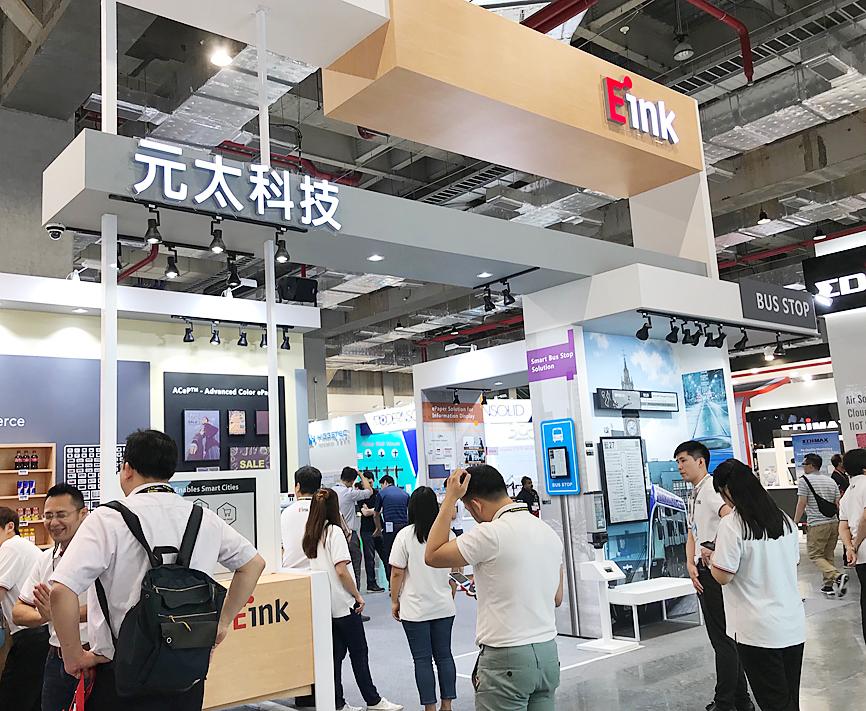E Ink Holdings Inc (元太科技), a supplier of e-paper displays, expects a slight uptick in growth this quarter as demand for e-readers and electronic shelf labels (ESLs) improves amid the effects of the COVID-19 pandemic, it said yesterday.
The pandemic is having only a minor impact on its operations, the Hsinchu-based company said, adding that its fab in China is expected to return to 90 percent capacity by the end of this month, from between 70 and 80 percent, as supply chains disrupted in January and last month recover.
Remote work and schooling policies due to city lockdowns are stimulating demand for e-paper used in e-readers, information boards on public transportation and medical devices.

Photo: Chen Mei-ying, Taipei Times
The growth of e-readers this month in China would entirely offset January’s and last month’s declines, company chairman Johnson Lee (李政昊) told an investors’ teleconference yesterday.
Even retailers and grocery stores have started using ESLs to to restock and reprice supermarket shelves quickly and easily, Lee added.
Demand for ESLs “is growing even faster than the period before the pandemic,” Lee said.
However, installation of ESLs would temporarily be affected by the coronavirus in European and US cities that are in lockdown, Lee said.
Overall, “when we look at the outlook for the first quarter, we think it should be a bit better than last year,” Lee said, implying that revenue this quarter would surpass the NT$2.95 billion (US$97.57 million) in revenue made in the first quarter of last year.
The coronavirus is affecting the supply side, so customers are ordering in advance over fears of supply constraints, he said.
To cope with increasing demand, E Ink plans to spend NT$1.2 billion on expanding capacity in New Taipei City’s Linkou District (林口), a company investment plan submitted to the Ministry of Economic Affairs showed.
It also plans to add manufacturing tools at its fab in Hsinchu, which would add some capacity, E Ink said.
Last year’s downtrend in royalty income would likely extend into this year, the company said.
Royalty income is expected to fall at a faster pace than the 5 percent annual decline posted last year, as active-matrix organic light-emitting diode displays are replacing LCD displays on smartphones, chief financial officer Lloyd Chen (陳樂群) said.
Last year, E Ink took in NT$2.24 billion in royalty income by licensing advanced fringe field switching LCD technology to flat-panel makers.
To make up for the loss in royalty income, E Ink said that it is investing in the e-paper ecosystem, such as forming partnerships with flat-panel makers to promote the adoption of e-paper displays.
The company’s efforts have increased sales of higher-margin e-paper materials, propelling its gross margin to 48 percent in the final quarter of last year and bringing full-year gross margin to 44.4 percent, from 41.7 percent in 2018.

In Italy’s storied gold-making hubs, jewelers are reworking their designs to trim gold content as they race to blunt the effect of record prices and appeal to shoppers watching their budgets. Gold prices hit a record high on Thursday, surging near US$5,600 an ounce, more than double a year ago as geopolitical concerns and jitters over trade pushed investors toward the safe-haven asset. The rally is putting undue pressure on small artisans as they face mounting demands from customers, including international brands, to produce cheaper items, from signature pieces to wedding rings, according to interviews with four independent jewelers in Italy’s main

Japanese Prime Minister Sanae Takaichi has talked up the benefits of a weaker yen in a campaign speech, adopting a tone at odds with her finance ministry, which has refused to rule out any options to counter excessive foreign exchange volatility. Takaichi later softened her stance, saying she did not have a preference for the yen’s direction. “People say the weak yen is bad right now, but for export industries, it’s a major opportunity,” Takaichi said on Saturday at a rally for Liberal Democratic Party candidate Daishiro Yamagiwa in Kanagawa Prefecture ahead of a snap election on Sunday. “Whether it’s selling food or

CONCERNS: Tech companies investing in AI businesses that purchase their products have raised questions among investors that they are artificially propping up demand Nvidia Corp chief executive officer Jensen Huang (黃仁勳) on Saturday said that the company would be participating in OpenAI’s latest funding round, describing it as potentially “the largest investment we’ve ever made.” “We will invest a great deal of money,” Huang told reporters while visiting Taipei. “I believe in OpenAI. The work that they do is incredible. They’re one of the most consequential companies of our time.” Huang did not say exactly how much Nvidia might contribute, but described the investment as “huge.” “Let Sam announce how much he’s going to raise — it’s for him to decide,” Huang said, referring to OpenAI

The global server market is expected to grow 12.8 percent annually this year, with artificial intelligence (AI) servers projected to account for 16.5 percent, driven by continued investment in AI infrastructure by major cloud service providers (CSPs), market researcher TrendForce Corp (集邦科技) said yesterday. Global AI server shipments this year are expected to increase 28 percent year-on-year to more than 2.7 million units, driven by sustained demand from CSPs and government sovereign cloud projects, TrendForce analyst Frank Kung (龔明德) told the Taipei Times. Demand for GPU-based AI servers, including Nvidia Corp’s GB and Vera Rubin rack systems, is expected to remain high,